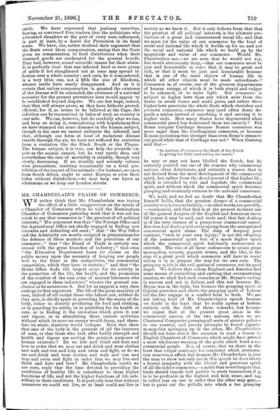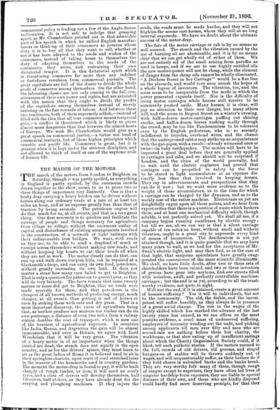MR. CHAMBERLAIN'S PRAISE OF COMMERCE.
WE rather think that Mr. Chamberlain was trying the effect of a little exaggeration on the minds of a Chamber of Commerce when he told the Birmingham Chamber of Commerce yesterday week that it was not too much to say that commerce is " the greatest of all political interests." His argument was that " the Foreign Office and the Agricultural Office are chiefly engaged in finding new interests and defending old ones ; " that " the War Office and the Admiralty are mostly occupied in preparations for the defence of these markets and the protection of our commerce ; " that " the Board of Trade is entirely con- cerned with the great branches of industry ; " that even "the Education Department bases its claims on the public money upon the necessity of keeping our people well to the front in the competition, the commercial competition, which they have to sustain ; " and that "the Home Office finds the largest scope for its activity in the protection of the life, the health, and the promotion of the comfort of the vast army of manual labourers who are engaged in these industries," whence the general con- clusion as he announces it. But let us suggest a very close analogy to that argument. The life of the great majority of men, indeed of all except those who labour not, neither do they spin, is chiefly spent in providing for the wants of the body, either in directly producing its food and clothing, or in guarding its safety, or in providing for its health or cure, or in finding it the recreation which gives it rest and vigour, or in stimulating those various activities without which its nervous energy would decay, and there- fore its whole elasticity would collapse. Does that show that care of the body is the greatest of all the interests of man, or that those who look after bodily strength and health and vigour are serving the greatest purposes of human existence ? Do we live and think and hate and love in order that we may eat and drink and wear clothes and walk and run and leap and swim and fight, or do we eat and drink and wear clothes and walk and run and leap and swim and fight in order that we may live and think and hate and love ? Mr. Chamberlain would, we are sure, reply that the time devoted to providing the conditions of healthy life is subsidiary to these higher functions of life, and not the higher functions of life sub- sidiary to their conditions. It is perfectly true that without commerce we could not live, or at least could not live in society as we know it. But it only follows from that that the greatest of all political interests is the ultimate pro- duction of a great and disinterested social life, and that we must try the value of our commerce by the kind of social and national life which it builds up for us, and not the social and national life which we build up by the magnitude and value of our commerce. Would Mr.. Chamberlain say,—we are sure that he would not say, but would strenuously deny,—that our commerce must be just and honourable in order that it may be great and rich, or that it must be just and honourable because that is one of the main objects of human life to- which all other objects must be made subordinate ? Commerce is, of course, one of the greatest departments of human energy, of which it is both stupid and vulgar to be ashamed, or to make light. But commerce is subject to higher laws than any which arise from the desire to avoid losses and make gains, and unless these higher laws penetrate the whole State which cherishes and protects commerce, commerce may (and often does) de- grade a nation instead of ennobling it and nerving it to higher ends. How many States have degenerated when commercial greed has dominated them too entirely ? Did Rome conquer Carthage because Roman commerce was more eager than the Carthaginian commerce, or because Roman patriotism was stronger than even Rome's commer- cial greed while that of Carthage was not ? When Canning said that— "In matters of commerce the fault of the Dutch Is giving too little and asking too much," he may or may not have libelled the Dutch, but he- certainly pointed out one of the reasons why commercial nations often deteriorate, and certainly a reason that is not derived from the mere development of the commercial spirit, but rather from the development of that higher life, which is intended to rule and regulate the commercial spirit, and without which the commercial spirit becomes grasping and eventually ruinous to the national conscience.
We hold, and we feel no doubt that Mr. Chamberlain himself holds, that the greatest danger of a commercial country is to be too exclusively,—in other words, too greedily, —commercial, and that this is at the present moment one of the gravest dangers of the English and American races. Of course it may be said, and truly said, that fair dealing is of the very essence of a prosperous commercial career. But true fair dealing will never spring from the unregulated commercial spirit alone. The duty of keeping your contract, "even to your own injury," is not the offspring of the commercial spirit but of a much higher spirit which the commercial spirit habitually endeavours to overrule. The rise of all these endeavours to create great monopolies, corners, gigantic trusts, and the like, is the sign of a great peril which commerce will have to resist unless it is to prepare the way for its own ruin. The grasping spirit is the evil genius of commerce, not its good angel. We believe that unless England and America find some means of controlling and curbing that overmastering passion, we shall find such crusades as Mr. Bryan's ending in success and not in failure, and this not because Mr. Bryan was in the right, but because the grasping spirit of Capital provokes and elicits the grasping spirit of Labour till the two engage in a conflict fatal to both. We are not taking hold of Mr. Chamberlain's speech because we doubt in the least that he really agrees at bottom entirely with the drift of these remarks, but because we regret that at the present great crisis in the commercial careers of the two nations, when we see Chartered Companies pursuing all sorts of sinister policies in one country, and greedy attempts to found gigantic monopolies springing up in the other, Mr. Chamberlain should not have seized the occasion to read a lesson to English Chambers of Commerce which might have proved a most wholesome warning of the perils which beset a too commercial people. Not, of course, that we share in the least that vulgar contempt for commerce which aristocra- cies sometimes affect, but because Mr. Chamberlain is just the man to show not only (as in this speech he does show) a hearty sympathy with the liberal and generous spirit of all the nobler commerce,—a spirit that never forgets that trade should benefit both parties to every transaction if it is to be profitable in the highest and best sense, and not to inflict loss on one in order that the other may gain,_ but to point out the pitfalls into which a too grasping commercial policy is leading not a few of the Anglo-Saxon millionaires. It is not safe to indulge that grasping spirit, as Mr. Chamberlain pointed out in that admirable part of his speech in which he rallied English manufac- turers on thinking of their consumers as persons whose duty it is to buy all that they want to sell, whether or not it has been adapted to the needs and wishes of the consumers, instead of taking home to themselves the duty of adapting themselves to the needs of the community they serve, .and restraining their own dictatorial temper. It is this dictatorial spirit which is threatening commerce far more than any indolent or fastidious revulsion from commercial pursuits. The great capitalists are full of the desire to divide the whole profit of commerce among themselves. On the other hand, the labouring classes are not only coming to the full con- sciousness of their own power and rights, but are saturated with the notion that they ought to divide the profits of the capitalists among themselves instead of merely insisting on the fair rewards of labour. And between these two tendencies, both of them supremely selfish,—instead of tilled with the idea that all true commerce means reciprocal gain,—a conflict is threatened which is likely to prove almost more dangerous than that between the armed hosts .sf Europe. We wish Mr. Chamberlain would give us a great speech on commercial justice,—a virtue not bred of commercial instincts, but of those higher principles which ennoble and purify life. Commerce is great, but it is greatest when it is kept under the strictest discipline, and not allowed to think of itself as one of the supreme ends of human life.























































 Previous page
Previous page